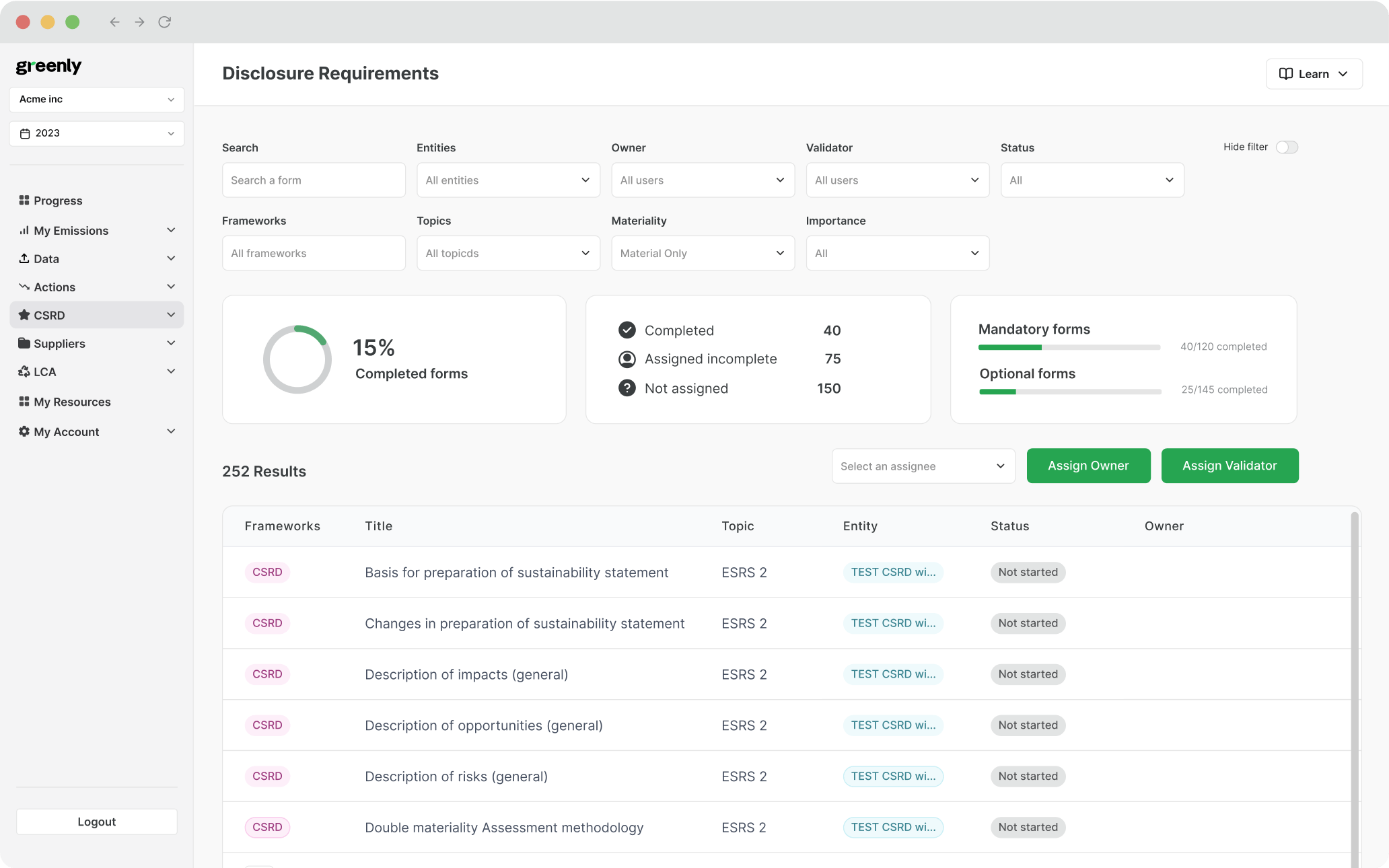
Impacts, Risks, and Opportunities (IRO) for CSRD Reporting
In this article, we’ll break down what IROs are, how to identify and assess them, and what CSRD requires in terms of disclosure.
ESG / CSR
Industries



Financial reporting rules determine how companies tell their story - from their bottom-line performance to how they manage long-term risks - and one of the most influential authors of those rules is the Financial Accounting Standards Board (FASB). While the FASB is a U.S.-based body responsible for U.S. GAAP, its influence is far from local. Because the U.S. is home to the world’s largest capital markets, the FASB’s standards effectively set the global pace for financial clarity.
It’s important to clarify that the FASB doesn’t set ESG-specific mandates. However, even for those outside the U.S., the board acts as a "north star". For decades, it has worked closely with the London-based International Accounting Standards Board (IASB) to align global rules. This means that whether you are in the UK or the U.S., the actual financial impact of things like climate risks, asset impairments, and long-term investments still flows through standards heavily shaped by the FASB’s work.
What the FASB is and why it was created
How the FASB develops and updates accounting standards
How it compares to other global standard-setters
Why the FASB remains relevant in an era of expanding sustainability reporting
The key priorities and debates shaping the FASB’s role in 2026
The Financial Accounting Standards Board (FASB) is the independent, private-sector body that writes the rulebook for U.S. GAAP (Generally Accepted Accounting Principles). If you’ve ever looked at a balance sheet or a revenue report and felt like you were comparing "apples to apples", it’s likely because of the FASB.
They determine the "how-to" for the biggest questions in business: how to recognise revenue, how to measure assets and liabilities, and how to present a company's risks to the public. In practice, the FASB’s job is to ensure that financial data isn't just a collection of numbers, but a reliable, consistent tool that investors and regulators can actually trust.
While their work is technical, their mission is straightforward:
Creating the blueprint
They develop and update U.S. GAAP for everyone from Silicon Valley tech giants to local non-profits.
Refining the lens
They constantly work to make financial reports clearer and more useful, ensuring they keep up with modern business shifts.
Global diplomacy
While their primary focus is the U.S., they spend significant time working with international boards to keep global accounting frameworks broadly aligned.
It’s easy to get these two confused, but there’s a clear line in the sand. The FASB handles businesses and non-profits, while its sister organisation, the Governmental Accounting Standards Board (GASB), sets the rules for state and local governments. Both are overseen by the same parent organisation - the Financial Accounting Foundation (FAF) - which keeps them independent and free from political or corporate lobbying.
The FASB didn’t just appear out of thin air. Its birth in 1973 was actually the climax of a decades-long struggle to make financial reporting more honest and independent.
Before the FASB, the U.S. had other bodies trying to set the rules. However, there was a growing problem: the people setting the standards were often doing it part-time while still working for the very industries they were regulating. This created a bit of a "fox guarding the henhouse" situation. Critics argued the system was too slow and too influenced by corporate interests to handle the increasingly complex global markets.
To fix this, the industry moved toward a fully independent, full-time model. Here is how that transition unfolded:
1959: The birth of the APB. The Accounting Principles Board (APB) was created to bring structure to financial reporting. It helped lay the foundations of U.S. GAAP, encouraging companies to follow consistent accounting rules so investors could meaningfully compare financial statements across organisations.
The 1960s: Growing pains. As business transactions became more complex, the APB struggled to keep pace. Because members served part-time and remained closely tied to their accounting firms, critics argued the board was too slow to respond and too exposed to industry influence.
1973: The FASB takes the reins. The APB was replaced by the Financial Accounting Standards Board, marking a major shift in governance. The new body was smaller, private-sector, and composed of full-time independent members required to sever most external professional ties, strengthening the objectivity of standard-setting.
Post-1973: Transparency as the standard. The FASB introduced a formal due process model, relying on public consultations, exposure drafts, and stakeholder feedback. This approach aimed to ensure that accounting standards were practical, robust, and reflective of real-world business and investor needs.
The shift to the FASB was a signal to the world that for capital markets to function, financial data had to be more than just accurate - it had to be unbiased.
The FASB doesn't operate in a vacuum. Rather than issuing top-down directives, it functions more like a high-stakes workshop. The goal is to ensure that every new standard is technically robust, but also "field-tested" by the people who actually have to use it.
Here is how a complex financial issue moves from a "problem" to an official part of the rulebook:
1. Identifying the gaps 🔎
The process begins by scanning the economic landscape for emerging issues. Whether it’s digital transactions or evolving views on lease accounting, the FASB looks for areas where existing rules leave too much room for interpretation.
2. Deep-dive research and consultation 🧠
Before drafting any new rule, the board consults widely with auditors, investors, academics, and preparers to understand how current standards perform in practice, not just in theory.
3. The “public beta” – exposure drafts 📝
Proposed standards are released publicly as exposure drafts. Stakeholders across the market are invited to comment, helping the FASB detect unintended consequences before rules are finalised.
4. Deliberation – seven voices, one vote 🗳️
Seven full-time, independent board members debate the technical merits of each proposal. To pass, an Accounting Standards Update (ASU) must survive a rigorous public voting process.
5. Updating the “source of truth” – the Codification 📚
Once approved, the new guidance is integrated into the FASB Accounting Standards Codification – the central, authoritative database for U.S. GAAP used by organisations to apply accounting rules consistently.
6. The post-implementation review 🔄
After publication, the FASB monitors how the new standard works in practice. If application issues arise, further clarifications or amendments may be issued to ensure smooth adoption.
The big picture: Throughout this cycle, the FASB operates under the oversight of the Financial Accounting Foundation (FAF) and with input from advisory bodies such as the FASAC. The aim is not to dictate how companies should behave, but to ensure that whatever they do – from managing climate risks to investing in intangible assets – is measured and reported in a consistent, decision-useful way.
Today’s reporting environment isn't a "one-man show". It’s a multi-layered ecosystem where different standard-setters handle different parts of a company’s story. While one board might focus on the carbon footprint, another - like the FASB - is focused on how that footprint actually hits the bank account.
The FASB sits at the very center of this system. Its job is to define the "financial truth" of a company. Around it, other global bodies fill in the gaps, creating a 360-degree view of corporate health.
Here is how the "big three" actually divide the work:
While these groups have different mandates, they are increasingly interconnected. As climate-related risks (the ISSB’s territory) begin to impact asset values and long-term liabilities (the FASB’s territory), these boards are constantly talking to each other. Understanding the FASB is the key to seeing how those big-picture global risks finally filter down into the actual financial statements.
Sustainability reporting is having a major moment, but it’s important to remember that these new disclosures don't replace financial reports - they rely on them. While a sustainability framework might explain the risks a company faces (like a new carbon tax), the FASB determines how those risks actually show up in the bank account.
In short: ESG narratives eventually have to be translated into the language of dollars and cents. Here is why the FASB remains the center of gravity in today’s markets:
Sustainability issues eventually become accounting issues. Whether it’s a "stranded asset" (like a factory that can’t run due to new climate laws) or a long-term fund for environmental cleanup, these things must be measured and recognised. The FASB ensures these impacts aren't just stories in a brochure, but hard numbers on a balance sheet.
One of the FASB's biggest contributions is comparability. Without a standard rulebook, two companies could experience the exact same event but report it in completely different ways. The FASB’s rules act as a universal benchmark, ensuring that:
The FASB stays relevant because it doesn’t stand still. As the economy changes, the board updates the rules. For example, they’ve recently tackled the "headache" of how to account for digital assets and crypto, and they are constantly reviewing how intangible assets (like software and IP) should be valued in a modern economy. They monitor the "real world" and issue updates (ASUs) to ensure the rules don't get dusty.
It’s a common mix-up: the FASB doesn't actually enforce the rules—that’s the job of regulators like the SEC. Instead, the FASB provides the technical foundation. This separation of powers is vital; it means the rules are developed by independent experts, while the "policing" is left to the government. It’s a checks-and-balances system that keeps the markets stable.
Has the FASB actually delivered on its promise? After 50 years, the consensus is that the board has successfully transformed U.S. accounting from a "choose your own adventure" system into a world-class standard.
But as we move through 2026, success is no longer just about stability - it’s about speed and adaptability. Here is a breakdown of the FASB’s track record and the new hurdles it's facing.
The FASB’s greatest achievement is the sheer credibility of U.S. GAAP. By building a shared rulebook, they’ve made it possible for an investor in London to trust the numbers of a company in New York.
The FASB’s success is best seen in its major "upgrades" over the years:
While the board has achieved its founding goals, the modern economy is throwing new, complex "curveballs" that are testing the FASB’s agility.
As of early 2026, the FASB is moving fast to clarify the "gray areas" of crypto. A major focus this year is determining whether stablecoins can officially be classified as "cash equivalents" and clarifying the rules for wrapped tokens. It’s no longer enough to just measure Bitcoin; the FASB is now defining the structure for the entire digital economy.
A common criticism in 2026—particularly from the Private Company Council (PCC)—is that major accounting changes can take too long to implement. There is growing pressure for the FASB to deliver results on new projects within a 12-to-24-month window to keep up with the breakneck pace of modern business.
The FASB is walking a fine line. While they aren't the "ESG police", they are under intense pressure to ensure that climate risks and environmental credits are reflected in the financial statements. Their success in 2026 depends on their ability to integrate these risks into GAAP without letting the accounting become political.
The Final Verdict
Is the FASB successful? Yes. It has built the most transparent and trusted capital market in history. But its work is never finished. In 2026, the board is evolving from a traditional rule-maker into a dynamic responder, tackling everything from AI-driven intangible value to blockchain settlement.
The mission hasn’t changed, but the stakes have never been higher.
The FASB issues U.S. Generally Accepted Accounting Principles (GAAP), which define how companies recognise revenue, measure assets and liabilities, and present financial statements. These standards are published as Accounting Standards Updates (ASUs) and incorporated into the Accounting Standards Codification.
FASB standards apply to public companies, many private companies, and not-for-profit organisations that prepare financial statements under U.S. GAAP. Regulators such as the SEC require GAAP-compliant reporting for listed companies.
The Codification is the central, authoritative online database of all U.S. GAAP. It organises accounting standards by topic, making it the primary reference point for accountants, auditors, and financial professionals.
New standards follow a formal due process: issue identification, research and consultation, publication of exposure drafts for public comment, board deliberation and voting, and final issuance as an Accounting Standards Update (ASU).
No. The FASB sets accounting standards, but enforcement is handled by regulators such as the Securities and Exchange Commission (SEC) and through external audits.
GAAP (set by the FASB) is a detailed, rules-based accounting framework, while IFRS (set by the IASB) is more principles-based and used internationally. Both aim to ensure transparent and comparable financial reporting, but they differ in structure and application.
The FASB updates standards on an ongoing basis through Accounting Standards Updates (ASUs). The timing depends on emerging issues, stakeholder feedback, and the complexity of the topic being addressed.
Yes, but indirectly. UK companies typically report under IFRS rather than U.S. GAAP, so they do not follow FASB standards directly. However, the FASB still matters for UK businesses that have U.S. listings, U.S. investors, or subsidiaries operating under GAAP. In addition, global investors often compare companies across GAAP and IFRS frameworks, meaning FASB standards can influence how UK firms are evaluated in international capital markets.
